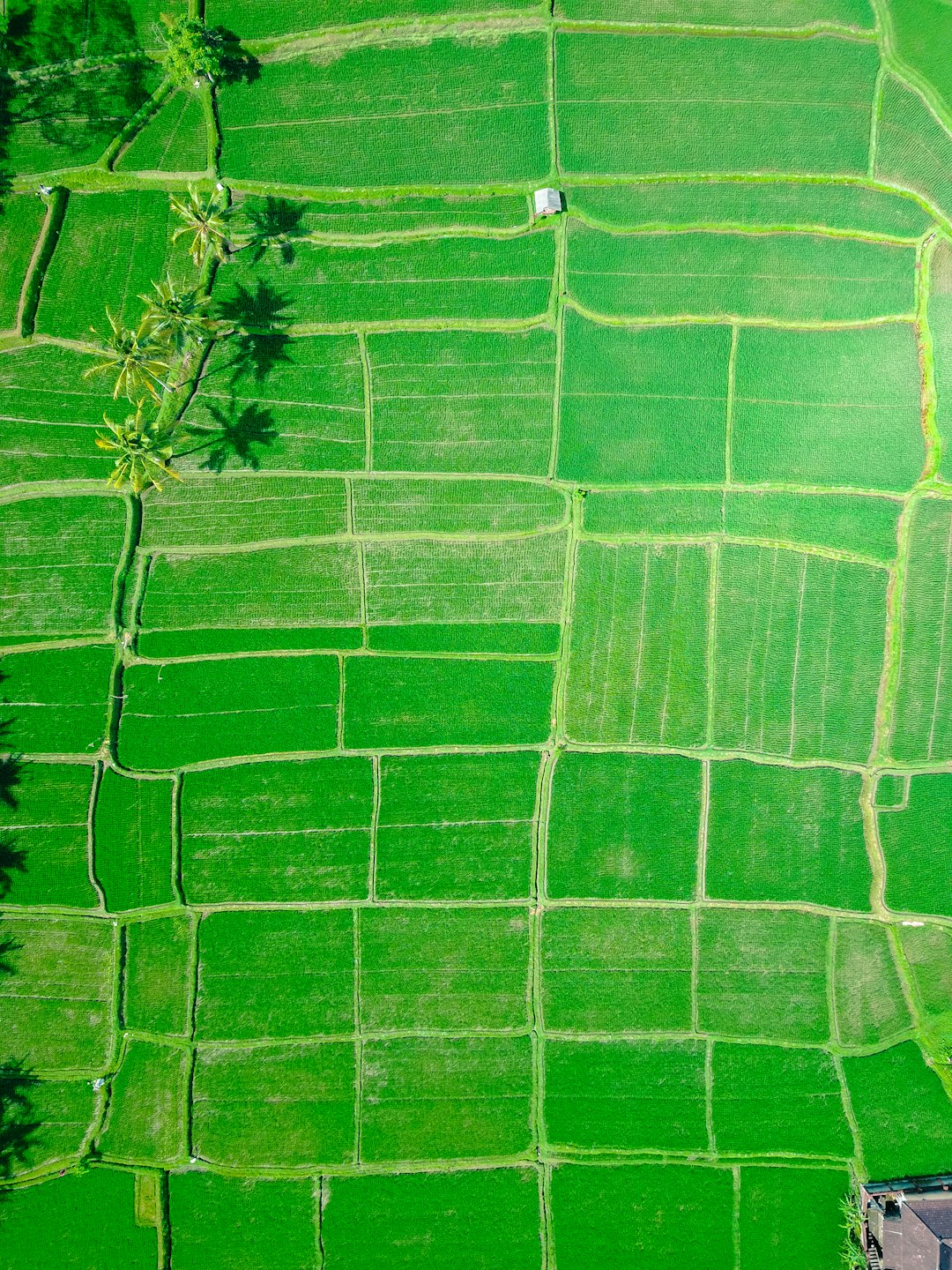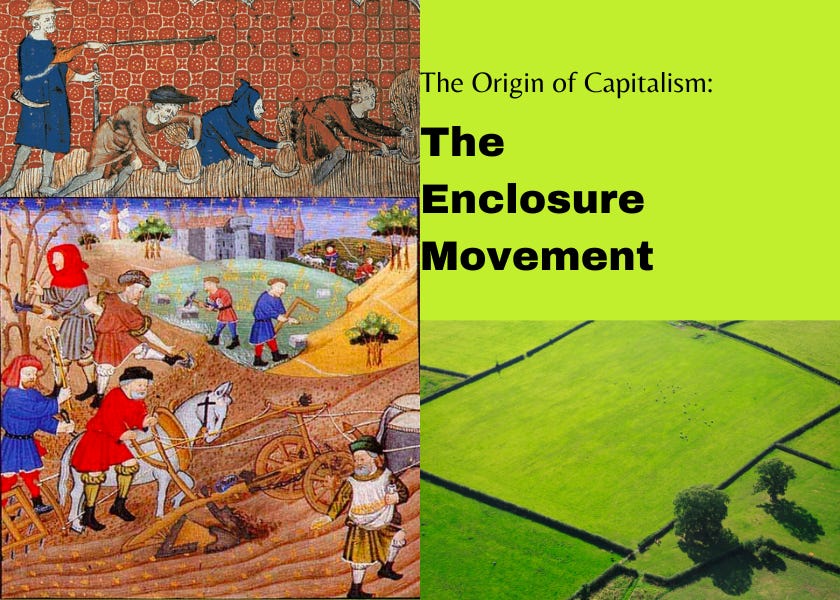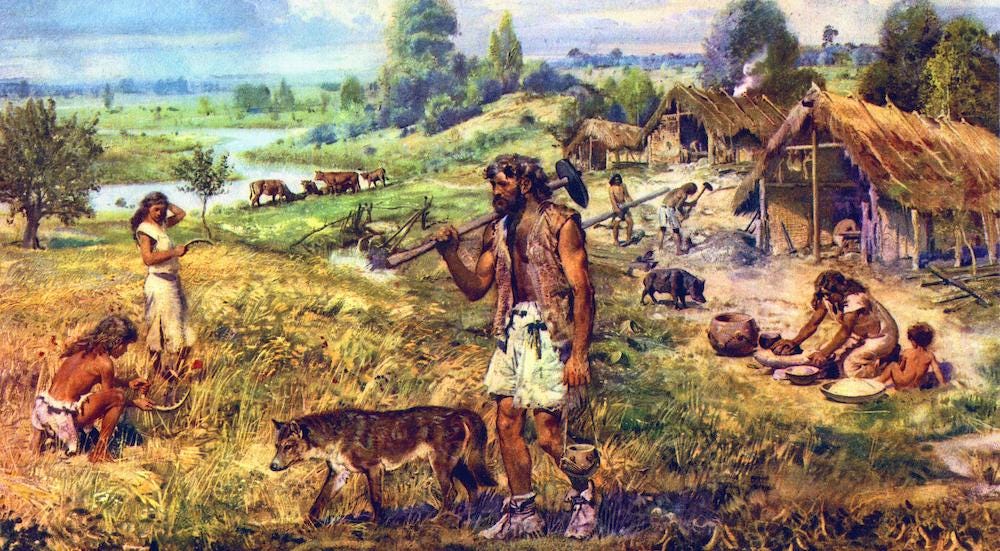The Origin of Capitalism: The Enclosure Movement
How English farming practices created Capitalist society.
Welcome to JoeWrote, a publication where I explain the limitations of our Capitalist society and explore realistic solutions drawn from the world of Socialism. Please like (click the ❤️ button at the top), share, and subscribe, either for free or paid.
Thank you for your support. In Solidarity — Joe
One of the greatest misunderstandings people have about Capitalism is that it is a natural system that arose and thrives absent human design. According to Capitalist theory, the private ownership of land and natural resources, the practice of wage labor, and the exchange of goods and services for currency through unregulated markets provide the best opportunity for resources to be distributed to maximal efficiency. Furthermore, it is believed that only when “the government” interferes with this “natural order” do problems arise.
The public didn’t come by this belief on their own, but rather by consuming the relentless free-market ideology that shapes American public education, guides our media and entertainment, and dictates the policies of both major political parties. An example of how this free-market belief manifests can be seen in the $7.25 federal minimum wage, which has not been raised since 2009. Hardline Conservatives still rant against the existence of a minimum wage, claiming it decreases business activity and hurts both owners and workers alike. And though moderate Republicans and Democrats don’t subscribe to this view, their economic policies come from the belief that the more Capitalism is interfered with, the worse the economy will be. It is for this reason that neither party has attempted to raise the minimum wage, despite both holding trifectas (the Presidency and both chambers of Congress) in recent memory.
But despite what American doctrine claims, Capitalism is not natural. Not only does it require continued maintenance from outside forces (mainly the government), but it did not arise naturally. Capitalism was artificially created, with the predominant catalyst being the European Enclosure Movement, which kickstarted Capitalism and grew it into the monolith we recognize today.
The Enclosure Movement
Capitalism is the private ownership of capital (the things that make the things we use or consume) for the purpose of creating profit. As all capital comes from land, for Capitalism to exist, the land must be privately owned. Only through the division of the Earth into plots and ownership of those plots given to individuals can profit be created. Otherwise, no one would be able to extract the natural resources that humans value (food, oil, water, etc.) and sell them for a profit.
Yet, there was a time when the land was not divided into privately-owned plots but seen as a collective good. Pre-historic tribes lived nomadically, and for much of recorded history, the soil of countries was owned by monarchs who afforded “their” land to the people, so that they may grow the food that would sustain the population.
In order for Capitalism to exist, at some point in history, land ownership needed to be transformed from these collective forms of ownership to the private form of ownership that exists today. This transition which occurred during the Medieval period, is known as “The Enclosure Movement.”
Starting in England in the 12th century, enclosure was the process of dividing and selling public grazing lands to wealthy landlords. Before this change, the common folk could support themselves with small herds of livestock, which grazed on the land that was open to all. But, once this land became private property, public grazing was prohibited. Unable to practice subsistence farming, the masses were now forced to become wage laborers for the lords who owned the now-private land. Naturally, the common folk did not like this. Enclosure riots were violent and common.

Like the rest of the world, 12th-century England was a predominantly agrarian society, meaning most of its occupants relied on farming to live. This societal shift of transferring land, which was the commoners’ main source of wealth (and therefore survival) from the people to the landlords jumpstarted the private ownership of capital and the institution of wage labor. And though 21st-century Capitalism looks very different than 12th-century farming communities, this still remains the core of our modern economic system.
Though the Enclosure Movement began in 12th-century England, it didn’t experience widespread growth until the 15th and 16th centuries. Mainland Europe took much longer to adopt enclosure, with the majority of its public lands being parceled up between the 16th and 18th centuries. Over the course of this half millennium, Europe drastically altered its configuration from one in which the common folk shared and lived off the land, to one in which they were subservient to those who owned it. Rich with profits from work they did not do, landlords, kings, and other members of the wealthy aristocracy invested in colonial projects and mercantile ventures, leading to Europe’s colonization of the globe, the Industrial Revolution, and Capitalism's eventual accession to the dominant economic system.
And though the agrarian Enclosure Movement ended centuries ago, in many ways the practice of enclosure is still being practiced to this day. Lands and resources that once belonged to the public (or, could belong to the public), are sold off to private owners so that they may create a profit. Just as Capitalism required an initial onset of agrarian enclosure, it lives on thanks to the continued enclosement of today’s sources of wealth.
I’ll detail the practice of modern enclosure in the next post. Be sure to subscribe so you don’t miss it.
If you enjoyed what you just read please consider supporting JoeWrote with a paid subscription. For less than a quarter per article, you can support my work and unlock everything JoeWrote has to offer.





Thought provoking piece. I might add that the Magna Charta and other similar relationships between nobles and monarchy, wherein it became understood that the nobles would benefit from land ownership and not just exist at the pleasure of the king, came to fruition shortly before this enclosure process, perhaps creating necessary conditions for the growth of capitalism.
Just finished 'Less Is More' and the author Jason Hickel includes a section about the enclosure movement. I believe you've mentioned this book before but thought I'd give it another promotion as I appreciated it and suspect others who read you stack will as well.